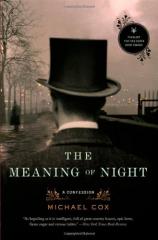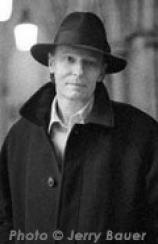Reading Group Guide
Discussion Questions
The Meaning of Night: A Confession

1. In the epigraph of The Meaning of Night, Edward Glyver offers his reader a warning: “I have sought, not truth, but meaning.” How much of Edward’s story do you believe?
2. What characteristics do Edward and Phoebus Daunt hold in common?
3. Why does Edward hesitate to confront Phoebus throughout the novel?
4. Our recognition of Edward is informed by his own portrayal of himself, including what are arguably his delusions of grandeur. How might other characters in the novel have described him—Phoebus, Fordyce Jukes, Tom Grexby, or Lord Tansor, for example?
5. What accounts for Edward’s attraction to Miss Emily Carteret in the face of Bella’s devotion?
6. Do you think any of Edward’s confidants—Le Grice, Mr. Tredgold, Bella—really believe what he says of his true identity?
7. Is his opium addiction the seat of Edward’s psychological turmoil? Might his story have ended differently had he not succumbed so often to its pleasures?
8. Is Emily Carteret deserving of Edward’s enduring sympathy? Is she deserving of ours?
9. Assuming Mr. Tredgold’s account of her marriage is true, do you think Lady Laura Tansor would have been proud of her son’s quest for vengeance?
10. Lucas Trendle is undoubtedly a blameless victim in the series of events recounted in The Meaning of Night. Can anyone else claim his innocence?
11. Despite being a longstanding bibliophile, in discovering the new technology of photography Edward professes to have found an even deeper passion. What does photography represent in counterpoint to the written word in The Meaning of Night?
12. What do Edward’s interactions with women, from his infatuation with Miss Cartaret to his regular indulgence in the services of London’s red-light district, reveal about the subtleties of his moral nature?
13. How does The Meaning of Night embody the common historical perception of the Victorian age as one of repression and moral prudishness?
14. What is Edward’s fatal flaw? Which holds the greater sway, in the end, over the course of Edward’s life—fate or human determination?








